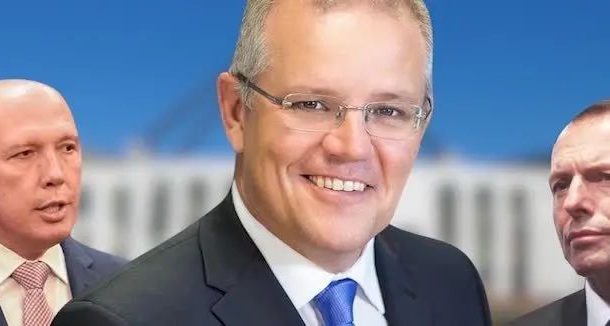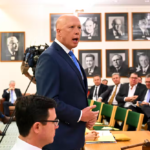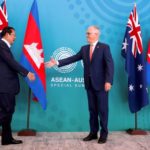What would happen if Scott Morrison wins?

Imagine this: despite more than 50 consecutive negative Newspolls, the Coalition manages to scrape home in the 2019 federal election. What kind of prime minister is Scott Morrison, buoyed by a long-odds victory, likely to be?
In this scenario, the Liberals who have the most potential to harm the government because of their right-wing agendas – Tony Abbott and Peter Dutton – would likely also remain in power. Abbott, a former prime minister, is facing an assertive “vote Tony out” campaign in Warringah, his seat on Sydney’s northern beaches.
Moderate Coalition supporters deplore Abbott for wrecking former prime minister Malcolm Turnbull’s attempts to construct an effective climate change policy, for opposing same-sex marriage, and for his role in ending Turnbull’s leadership.
Meanwhile Dutton, the tough-talking Minister for Home Affairs, holds his Queensland seat of Dickson with a 2 per cent margin. While Dutton is popular with members of the Liberal National Party in Queensland, and his uncompromising stance on asylum seekers resonates with the state’s One Nation supporters, progressive Brisbane voters have been less impressed by him, and there’s considerable opposition to him in southern states.
“If the Liberals get back – and I think that’s a stretch – there’s more chance that Abbott and Dutton will still be around.”
Since defeating Dutton in a leadership spill in August last year, Morrison has attempted to position himself as the accidental prime minister; a contender who’s not too wet (Turnbull) nor too dry (Dutton).
Background reporting on the machinations behind the spill have revealed that Morrison made a calculated move on the leadership while he was the treasurer, professing loyalty to prime minister Turnbull before the cameras. Morrison’s supporters instructed allies to vote for Dutton in his first attempt to oust Turnbull, and then to shift their votes to him in the second spill, after Turnbull pulled out of the race.
Monash political scientist and emeritus professor James Walter says that if Morrison won the election, his ability to govern would inevitably be affected by the profound divisions in his party.
“If the Liberals get back – and I think that’s a stretch – there’s more chance that Abbott and Dutton will still be around.”
In Australia, but also in Britain, “anti-Labor parties are deeply divided, their membership is much smaller than it used to be, and their beliefs diverge from popular opinion”, he says.
“So you have a very small, strident group of activists, and they’re always going to be demanding things that are at odds with the majority. And, to some extent, at odds with other people who might be persuaded to vote Liberal. Whoever gets there, until they can address that, or revive what Howard called ‘the broad church’, it’s going to be difficult.”
In Australia, that activist fringe is pro-coal – Morrison spoke to them in February 2017 when he brought a lump of coal into the Parliament, saying “Don’t be afraid”. This fringe is also xenophobic. Morrison proved his worth to them when he “stopped the boats” while serving as immigration minister.
Since becoming PM, Morrison has posed as the affable “Everyman”, assuring Australians that our Paris climate change commitments, for example, will be met “in a canter” (despite independent evidence to the contrary). He’s also refused to be drawn on why he came to be sitting in Turnbull’s office (“That is a question I can’t answer,” Morrison has said).
“If you follow political coverage, you know how he got there,” Professor Walter says. “[Opposition Leader Bill] Shorten keeps asking him about it, as a way of getting him to confess, which of course he won’t do.”
Will these manoeuvres work against Morrison come election day?
“It’s hard to say now, in the age of Trump,” Professor Walter says. Australia has been less affected by “post-truth politics”, but “people now have such low regard for politicians that concluding that this person is dissembling” is no longer electoral poison.
“They say, you know, all politicians do that.” Although the Coalition has consistently trailed Labor in the polls, Morrison remains more popular than Shorten.
Morrison’s most recent electoral gambit was the budget, which Professor Walter says reminded him of the budget delivered by Liberal prime minister Billy McMahon in 1971.
Before becoming leader, McMahon had been the treasurer. He was trained in economics, and recognised the signs of economic trouble on the horizon. But when he delivered the 1971 budget, McMahon’s political ambitions overcame his economic nous and he “spent liberally” trying to head off the threat represented by Gough Whitlam and the Labor Party.
“I don’t think Morrison is spending wildly, but he is spending much more freely than any of the Coalition governments have in the past six years,” Professor Walter says. “And it’s clearly targeted at electoral advantage. It will bring some benefits to the middle class, and I think that’s an attempt to bring back the disaffected Liberal voters.”
Will the strategy work?
Professor Walter says the Liberal Party has strayed from the party presided over by its founder, Robert Menzies, one that supported free enterprise, but that also saw a role for state intervention when necessary. Many Australians would support this vision of Liberalism if they had the opportunity, he believes.
The hardliners in the party “are not going to attack Morrison now, because it’s too close to the election, but in the long run, as soon as they try to do more ‘small l’ liberal-type things in government – and some they’re already committed to because of this budget – I think he will run into trouble”, Professor Walter says.
Because if Morrison survives as PM, it will most likely mean that Abbott and Dutton, and the beliefs they represent, will be right there with him.
This article was published by Lens.
Open Forum is a policy discussion website produced by Global Access Partners – Australia’s Institute for Active Policy. We welcome contributions and invite you to submit a blog to the editor and follow us on Twitter, Facebook, Linkedin and Mastadon.












